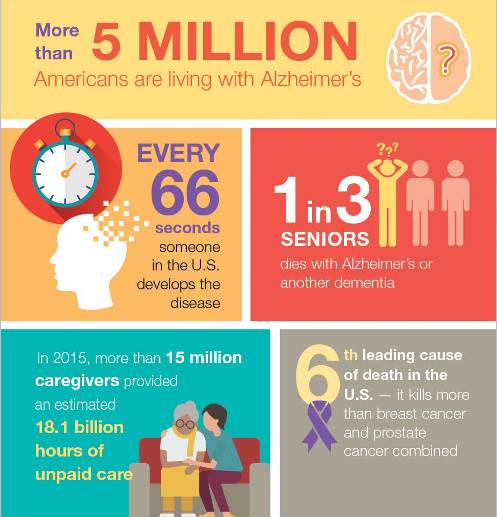When to seek help for memory loss

Everyone forgets things at times. How often have you misplaced your cellphone or car keys? Have you ever forgotten the name of a person you just met?
Some degree of memory problems and a modest decline in other thinking skills are common parts of aging. However, there's a difference between normal memory changes and memory loss associated with dementia, Alzheimer's disease and other related disorders. And some memory problems could be caused by other treatable conditions.
Memory loss and aging
It's normal to have minor memory loss as you age. This type doesn't prevent you from living a full, productive life. For example, you may occasionally forget an acquaintance's name but recall it later. You might misplace your glasses or need to write a list to remember tasks.
These changes in memory can be irritating, but are normal and manageable. They don't disrupt your ability to work, live independently or maintain a social life.
Memory loss and dementia
Dementia isn't a specific disease. It's a group of symptoms that affect memory, reasoning, judgment, language and other thinking skills.
Dementia usually begins gradually, worsens over time and interferes with a person's daily life, including working, managing daily tasks, social interactions and relationships.
Memory loss often is one of the first or more recognizable signs of dementia. Other early signs can include:
- Asking the same questions repeatedly.
- Forgetting common words when speaking.
- Mixing words up, such as saying "bed" instead of "table."
- Taking longer to complete familiar tasks, like following a recipe.
- Misplacing items in inappropriate places, such as putting a wallet in a kitchen drawer.
- Getting lost while walking or driving in a familiar area.
- Having changes in mood or behavior for no apparent reason.
Mild cognitive impairment
Mild cognitive impairment involves a notable decline in at least one area of thinking skills, like memory. This decline is greater than the changes of aging and less than those of dementia. Having mild cognitive impairment doesn't prevent you from performing everyday tasks and being socially engaged.
Researchers and physicians are still learning about mild cognitive impairment. For some people, the condition doesn't worsen, and they can remain independent. For others, mild cognitive impairment is an early symptom of Alzheimer's disease or another disorder causing dementia.
Reversible causes of memory loss
Many medical problems can cause memory loss or other dementia-like symptoms. Most of these conditions can be treated. Your health care team can screen you for conditions that cause reversible memory impairment.
Possible causes of reversible memory loss include:
- Medications
Certain medications or a combination of medications can cause forgetfulness or confusion. - Minor head trauma or injury
A head injury from a fall or accident — even if you don't lose consciousness — can sometimes cause memory problems. - Emotional disorders
Stress, anxiety or depression can cause forgetfulness, confusion, difficulty concentrating and other problems that disrupt daily activities. - Sleep disorders
Poor quality or insufficient sleep can cause mental fogginess and forgetfulness that can interfere with a person's daily life. Obstructive sleep apnea is a common example of a sleep disorder that causes cognitive impairment that can be reversed with treatment of the underlying problem. - Alcoholism
Chronic alcoholism can seriously impair mental abilities. Alcohol also can cause memory loss by interacting with medications. - Vitamin B12 deficiency
Vitamin B12 helps maintain healthy nerve cells and red blood cells. A vitamin B12 deficiency, common in older adults, can cause memory problems. Learn how to maximize memory function with a nutrient-rich diet. - Hypothyroidism
An underactive thyroid gland, or hypothyroidism, can result in forgetfulness and other thinking problems. - Brain diseases
Although less common than other causes, a tumor or infection in the brain can cause memory problems or other dementia-like symptoms.
When to see your health care team
Talk with your health care team if you're concerned about memory loss or if a family member has brought up concerns about changes in your thinking. Sometimes the people who know you best will notice changes earlier than you will. It's good to have a family member or friend along to answer some questions based on observations.
Questions you may be asked may include:
- When did your memory problems begin?
- What medications, including prescription drugs, over-the-counter drugs and dietary supplements, do you take and in what doses?
- Have you recently started a new drug?
- What tasks do you find difficult?
- What have you done to cope with memory problems?
- How much alcohol do you drink?
- Have you recently been in an accident, fallen or injured your head?
- Are you having difficulty sleeping?
- Have you recently been sick?
- Do you feel sad, depressed or anxious?
- Have you recently had a major loss, change or stressful event in your life?
You may have a general physical exam, blood tests or brain imaging. These can help identify reversible causes of memory problems and dementia-like symptoms.
You might be referred to a specialist who can diagnose dementia or memory disorders, such as a neurologist, psychiatrist, neuropsychologist or geriatrician. You may need additional testing, known as a neuropsychological test, to determine whether your thinking changes are normal for your age or not.
The importance of a diagnosis
Coming to terms with memory loss and the possible onset of dementia can be difficult. Some people try to hide memory problems, and some family members or friends compensate for a person's memory loss ― sometimes without being aware of how much they've adapted to the impairment.
Getting a prompt diagnosis is important, even if it's challenging. Identifying a reversible cause of memory impairment enables you to get appropriate treatment.
Also, an early diagnosis of mild cognitive impairment, Alzheimer's disease or a related disorder is beneficial because you can begin treatment, identify resources, settle legal matters and determine future care preferences.
Learn more about brain health:
- 5 tips to keep your brain healthy
- Understanding dementia and Alzheimer's disease
- Living with mild cognitive impairment
Anne Shandera-Ochsner, Ph.D., is a clinical neuropsychologist in La Crosse and Onalaska, Wisconsin.



